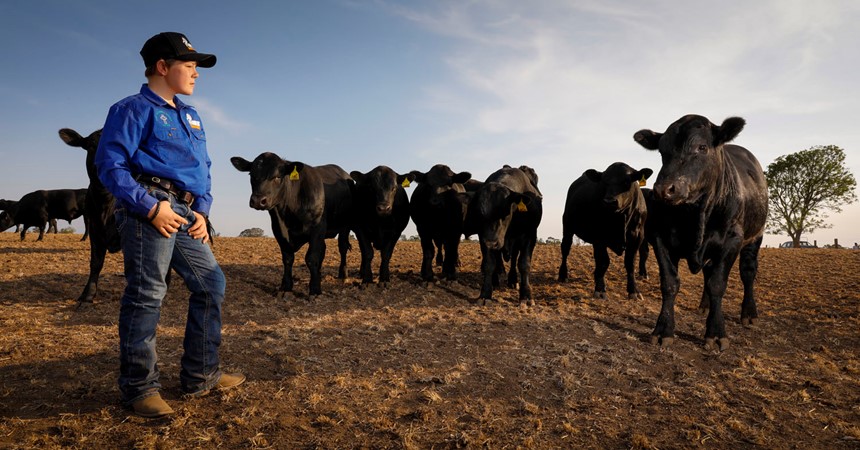Jacob Merrick, 11, already has a sound understanding of the effect drought is having on his community in the Lower Hunter. His parents bought the farm on which he now lives when he was just one, and they've worked hard to produce lucerne ever since. Each day, both before and after school, and on weekends, Jacob joins his father working on the property.
"I help dad produce the lucerne, cut the bales of hay and load it, as well as take orders,” he said. "We get lots of phone calls and emails, particularly now we're in a drought, from people wanting to buy lucerne so they can feed their livestock. We can't keep up with the demand and have to turn people away."
Jacob explains this dilemma with a level of maturity well beyond his years.
"It's stressful,” he said. “But unfortunately, it's not just a matter of sowing more seeds, because we too are experiencing the impact of drought. We’re using twice the amount of water for half the yield. Our expenses have doubled. It makes me really upset, but I guess that's just the way things are at the moment."
A student of St Catherine's Catholic College, Singleton, Jacob has been involved in the school's agricultural program under the guidance of Joanna Towers, since he was eight.
Ms Towers said worsening drought conditions was making it far more challenging to manage the school's property and livestock.
"Everywhere I know to call and buy feed is sold out,” she said. “It is next to impossible. That's only going to get harder as access to water becomes more restricted. People in the Hunter are very resilient, and we’re in a lot better position than many others around the country with some water still in the dams, but I think there is this feeling that … it's starting to impact people.
“We are doing a lot of praying at school. There are times where we are going to feel down about it, but we can't give up. It will rain again."
St Catherine's agricultural class recently hosted a fundraiser where calves born and bred on its farm were sent to butcher and auctioned as meat raffles. The initiative raised $5500, which went back into the school farm to assist with feed costs, and some meat packs were donated to the Broke Rural Fire Service.
Ms Towers said the drought is forcing students to think of ways to develop sustainable farming practices in times of adversity. Jacob said the lessons he is learning at school are helping him understand the realities of farming.
“We're taught which stock are best to buy at different times, particularly in drought,” he said. “Things don't come cheap on a farm."
Aside from increasing costs, Jacob also describes the toll the drought is taking on mental health.
"I do work experience with farmers in the area," Jacob said, "and I see it's hard for them to concentrate because they're losing stock either through having to sell them, or because they're dying because of the heat and lack of water.
"I reckon the drought is making a lot of people depressed. Most of the farmers have big families, and they can't afford to keep their farms and their families going. It's tough."
Jacob said that aside from a few lucerne paddocks, everywhere around his house is brown and lifeless and dust hazes are common. Yet, even with a first-hand understanding of drought and farming he is keen to follow the family tradition.
"I definitely want to be a farmer one day," said Jacob, "it's something I enjoy doing, and I just love animals and the fresh air. I could never have an office job. As well as producing lucerne, I'd also like to get into cattle farming and eventually have my own stud. And, to be a vet.”
Agricultural studies are on the rise at universities after a two-decade lull, so he's not alone.
"I don't know when the rain will come, but dad reckons it will come this month or next. Something has to give soon,” Jacob said.
Help in drought
CatholicCare Social Services Hunter-Manning is offering free and confidential counselling services to drought-affected individuals and families within the Diocese. To make an appointment phone (02) 4979 1120.























































































